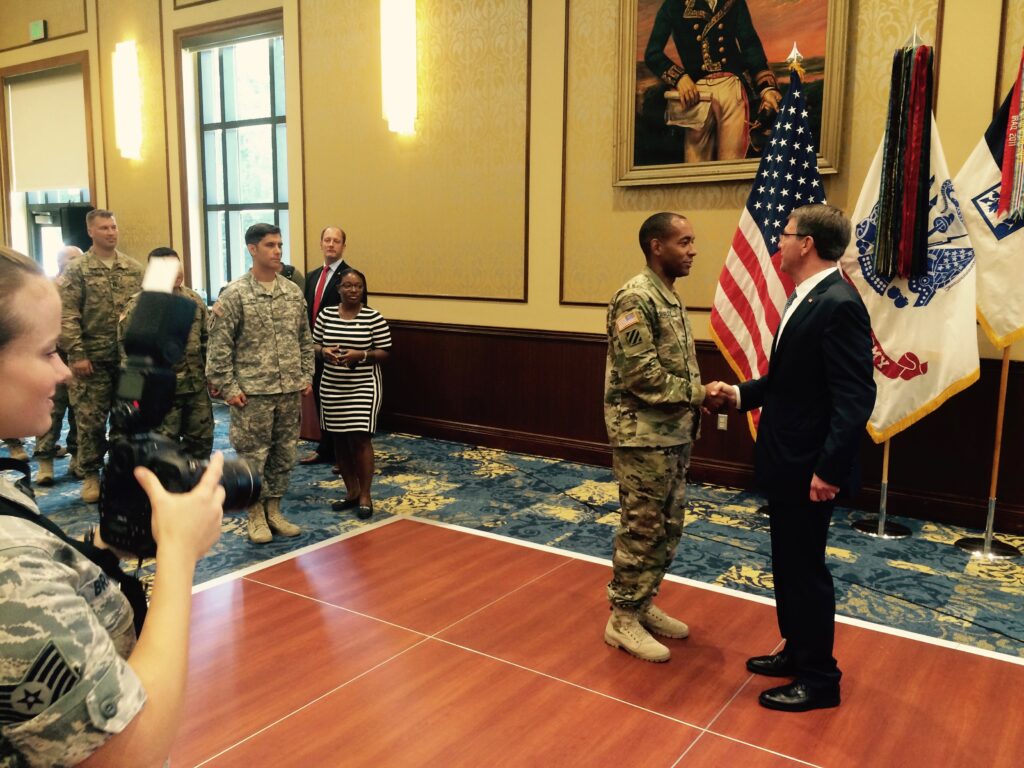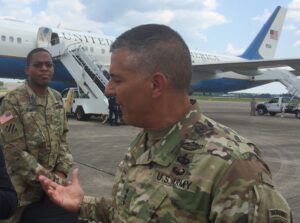
18th Airborne Corps soldiers meet Defense Secretary Ash Carter.
FORT BRAGG, NC: The US is not practicing traditional counter-insurgency (COIN) warfare in Iraq and Syria. Instead, the US is providing high-tech firepower, cyber power, and other “enablers” to local allies who don’t have them, Defense Secretary Ashton Carter said here today. That approach, which ranges from stealth fighters to “cyber bombs,” has a lot in common with how the US would oppose Russian aggression in Europe.
Next month, the commander of the Bragg-based 18th Airborne Corps, Lt. Gen. Steve Townsend, and about 450 of his HQ staff will deploy to Kuwait to take over the war against Daesh (the self-proclaimed Islamic State). His advance team is on the ground, Townsend told reporters on the runway next to Carter’s plane. But other 18th Airborne elements just came back from the Russian-focused Anakonda wargames in Eastern Europe, while still others man the Global Response Force, required to respond to crises anywhere on Earth in 18 hours.

Lt. Gen. Steve Townsend, commander of the 18th Airborne Corps and soon commander of the war in Iraq and Afghanistan.
“The people you saw here in this room, they’re capable of all that,” Carter told reporters after his remarks. “They’re trained from…the high end of the combat spectrum right down to what is called the low end but which is still dangerous counterterrorism, counterinsurgency,” he said.
“They’re also very good at enabling other militaries,” Carter said, “and that’s also going to be one of their principal functions: training, advising, and assisting, and giving the high-end stuff to forces that don’t have it and need it like Iraqi forces.”
High technology seems increasingly applicable to so-called low-intensity war. That’s a good thing because the US military has to equip, train, and organize itself for both.
“We’re busy because we have the counter-ISIL campaign to win — which we will do — but in Europe…we are standing with our NATO allies against aggression, both the traditional sort of aggression and…‘hybrid warfare,’ which is the ‘Little Green Men,’” Carter said, referring to the Russian troops without insignia who seized Crimea. Then there’s China, North Korea, and Iran, he said: A global power can’t pick and choose which threats it prepares for.
Indeed, sometimes the US military seems schizophrenic as it simultaneously pivots ships to the Pacific, armored vehicles to Europe, and advisors to Iraq and Afghanistan. As varied as the threats and theaters are, however, there are enough common factors that the US doesn’t need to reinvent the wheel for each one. Russia’s Ukrainian separatist proxies aren’t so different from Hezbollah militia or Islamic State fighters, for example, and all our adversaries now use hackers. Airpower is a universal solvent to military problems, but so, increasingly, is cyber.
“In warfare, we always try to disrupt and destroy the enemy’s command and control, (and) in today’s world that’s partly over the Internet,” Carter told an information operations officer at a Q&A with troops. The Islamic State, he said, uses “the Internet and other means to command and control their forces, dominate the population, collect income: all of that we need to destroy.”
Our technical cyber warfare skills are actually ahead of our counter-propaganda “information warfare” skills. US performance in the war of ideas “wasn’t so good, (is) getting better, needs to get better still,” Carter admitted to the 18th Airborne troops. “It wasn’t something we got into — you know, going back now a year or two — as quickly as we should have.”
“Last fall,” however, “we started to expand our military campaign to every domain, including cyber and space,” Carter said.
That new effort included a new HQ to command all aspects of the war, from airstrikes to advising. Lt. Gen. Sean MacFarland, who currently holds the job, will soon hand that job over to Townsend.
“Steve will have the air war, the cyber war, the space war, the ground war, the training, logistics, equipment, force protection, the whole deal,” Carter said. “One of the important things that we did in establishing the command General Townsend will fill is precisely that: put everything underneath that command. Whatever he needs he’ll get. Whatever’s over there, he’s in charge of; and in today’s campaign against an enemy like ISIL it runs the whole spectrum, all the way from airpower to cyber.”
Airpower advocates argue an Air Force general ought to be in charge, rather than Army generals like MacFarland and Townsend, because airpower is the main American contribution and shouldn’t be subordinated to the slow pace of the ground campaign. As Carter outlined future operations, however, he spoke entirely about anti-Daesh ground forces and the ground they must retake.
Newly-trained Iraqi army brigades are now moving from their training areas in the south to staging areas near the key northern city of Mosul, Carter said. While Iraqi central government forces advance on Mosul from the south, the semi-independent Kurdish pershmerga fighters will move in from the north to complete the encirclement. Meanwhile “mopping up” operations continue in the Tigris and Euphrates valleys.
In Syria, the US and its partners will continue isolating Daesh fighters from foreign fighters and supplies, building on recent successes of Syrian (mostly Kurdish) fighters around Manbij. The coalition is also trying to open a second front in the south, to give Jordan a buffer zone between its territory and the Islamic State’s while helping seal the Iraq-Syria border.








